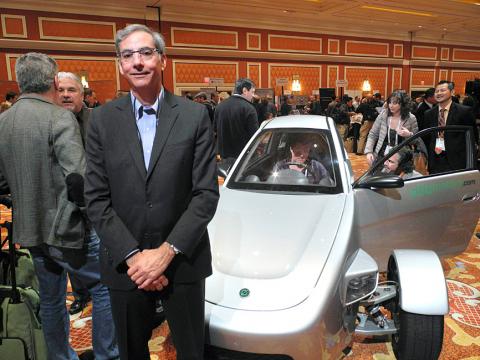The sleek three-wheeled car looks futuristic, but, as its creator acknowledges, it uses no new technology.
What makes the Elio Motors vehicle unique is its ultra-high fuel economy and an ultra-low price tag: US$6,800.
The vehicle, which was on display at the Showstoppers startup showcase on the sidelines of the Consumer Electronics Show in Las Vegas, Nevada, promises to deliver as much as 134km per 3.8 liters of gasoline for highway driving.

Photo: AFP
It accelerates as quickly as many cars on the road — to 161kph in 9.6 seconds, according to the company. Urban fuel economy is estimated at 79km per 3.8 liters of gasoline.
Company founder Paul Elio said he came up with the idea because “I got mad about seeing all this wealth leave the country” for imported petroleum.
An engineer by training, Elio began the firm in 2008 and recently took over an abandoned General Motors plant in Louisiana — one which had been producing the gas-guzzling Hummer.
In order to deliver the best fuel economy, the car has a cockpit wide enough only for the driver, with a passenger seat in the rear. It has two wheels in front and tapers in the rear to a single wheel.
“Front-to-back seating, that’s the key to mileage,” Elio said.
This makes it principally a one-person car, but Elio said the vehicle is a good solution for the millions who drive along to work or leisure events.
Elio readily admits there is no special technology in the car — it has a three-cylinder internal combustion gasoline engine, power windows, air conditioning and anti-lock brakes.
While it does not have some of the on-board electronic gadgety found in other vehicles, drivers can connect their smartphones for navigation, apps and more.
“This was a design completely based on existing engineering,” Elio spokesman Jim Andrews said.
The car has a top crash-impact rating from the US National Highway Transportation Safety Board, and is expected to meet all US safety standards.
Elio is targeting the US market, but hopes to eventually ship internationally. He has order deposits from more than 6,000 customers and hopes to start delivering in the first quarter of next year.

With an approval rating of just two percent, Peruvian President Dina Boluarte might be the world’s most unpopular leader, according to pollsters. Protests greeted her rise to power 29 months ago, and have marked her entire term — joined by assorted scandals, investigations, controversies and a surge in gang violence. The 63-year-old is the target of a dozen probes, including for her alleged failure to declare gifts of luxury jewels and watches, a scandal inevitably dubbed “Rolexgate.” She is also under the microscope for a two-week undeclared absence for nose surgery — which she insists was medical, not cosmetic — and is

CAUTIOUS RECOVERY: While the manufacturing sector returned to growth amid the US-China trade truce, firms remain wary as uncertainty clouds the outlook, the CIER said The local manufacturing sector returned to expansion last month, as the official purchasing managers’ index (PMI) rose 2.1 points to 51.0, driven by a temporary easing in US-China trade tensions, the Chung-Hua Institution for Economic Research (CIER, 中華經濟研究院) said yesterday. The PMI gauges the health of the manufacturing industry, with readings above 50 indicating expansion and those below 50 signaling contraction. “Firms are not as pessimistic as they were in April, but they remain far from optimistic,” CIER president Lien Hsien-ming (連賢明) said at a news conference. The full impact of US tariff decisions is unlikely to become clear until later this month

GROWING CONCERN: Some senior Trump administration officials opposed the UAE expansion over fears that another TSMC project could jeopardize its US investment Taiwan Semiconductor Manufacturing Co (TSMC, 台積電) is evaluating building an advanced production facility in the United Arab Emirates (UAE) and has discussed the possibility with officials in US President Donald Trump’s administration, people familiar with the matter said, in a potentially major bet on the Middle East that would only come to fruition with Washington’s approval. The company has had multiple meetings in the past few months with US Special Envoy to the Middle East Steve Witkoff and officials from MGX, an influential investment vehicle overseen by the UAE president’s brother, the people said. The conversations are a continuation of talks that

CHIP DUTIES: TSMC said it voiced its concerns to Washington about tariffs, telling the US commerce department that it wants ‘fair treatment’ to protect its competitiveness Taiwan Semiconductor Manufacturing Co (TSMC, 台積電) yesterday reiterated robust business prospects for this year as strong artificial intelligence (AI) chip demand from Nvidia Corp and other customers would absorb the impacts of US tariffs. “The impact of tariffs would be indirect, as the custom tax is the importers’ responsibility, not the exporters,” TSMC chairman and chief executive officer C.C. Wei (魏哲家) said at the chipmaker’s annual shareholders’ meeting in Hsinchu City. TSMC’s business could be affected if people become reluctant to buy electronics due to inflated prices, Wei said. In addition, the chipmaker has voiced its concern to the US Department of Commerce